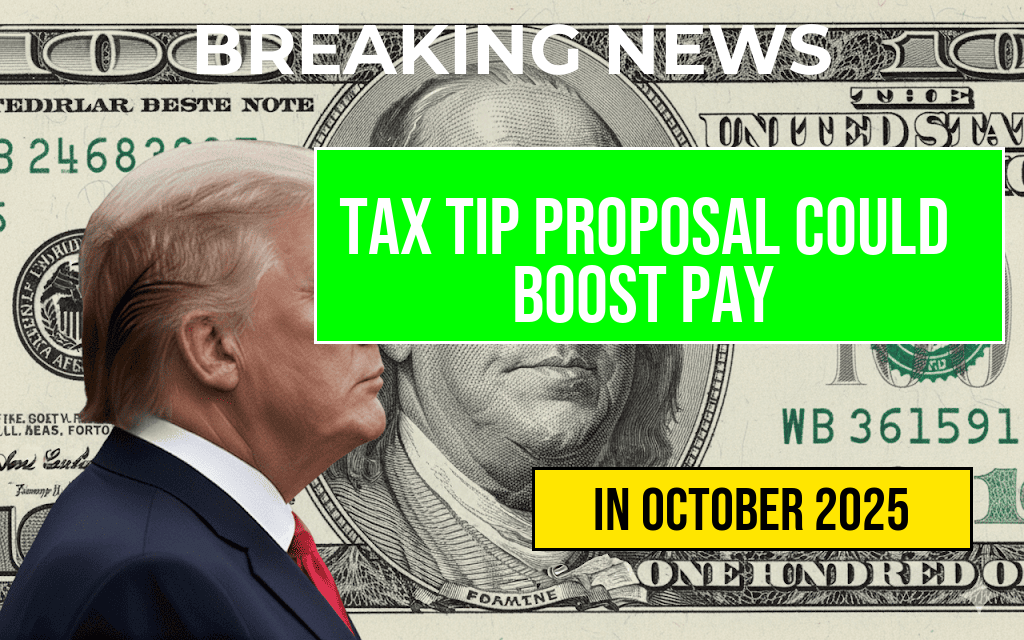Maximize Your Tips: Up to $25,000 Could Be Tax-Free While Payroll Taxes Still Apply
Many American workers who rely on tips—such as servers, bartenders, and ride-share drivers—may soon see changes to how their income is taxed, thanks to recent updates from the IRS. Under the new guidelines, tips received during the year up to **$25,000** could qualify as **tax-free income**, provided certain conditions are met. However, even if tips are exempt from federal income tax, **payroll taxes**—including Social Security and Medicare contributions—continue to apply. This shift aims to ease the tax burden for lower- and middle-income earners, but it also introduces new considerations for tax planning and compliance. Understanding the specifics can help workers optimize their take-home pay and avoid unexpected tax liabilities.
What Are Tips and How Are They Currently Taxed?
Tips are voluntary payments received by employees for services provided. These can be cash tips, tips added to credit card payments, or even non-cash gratuities. The IRS considers tips taxable income, and employees are required to report and pay taxes on them. Employers typically withhold payroll taxes based on reported tips, and employees must report all tips exceeding $20 in a month.
Historically, tips have been taxed as ordinary income, with the full amount subject to federal income tax and payroll taxes. This structure ensures that workers contribute to Social Security and Medicare, but it can also result in a significant tax bill, especially for those earning large tips.
New IRS Guidelines: Up to $25,000 in Tips May Be Tax-Free
The IRS introduced a measure allowing certain employees to receive up to $25,000 in annual tips without paying federal income tax on that amount. This change is part of efforts to reduce the tax burden on workers with modest earnings from tips, particularly in the hospitality and service industries.
To qualify, employees must meet specific criteria:
- They must report their tips accurately to their employer.
- The total tips reported must not exceed the $25,000 threshold annually.
- The tips must be received in connection with a taxable service, such as in restaurants, bars, or ride-sharing services.
For workers earning more than this threshold, only the first $25,000 of tips are potentially tax-free, with the remaining amount subject to regular income taxation.
Payroll Taxes Continue to Apply
While the new rule offers relief from federal income taxes on tips up to $25,000, it does not exempt workers from payroll taxes. Social Security and Medicare taxes are still assessed on the full amount of tips earned, regardless of whether those tips are considered taxable income for federal income tax purposes.
This means employees will still see payroll taxes deducted from their paychecks based on their total tips, ensuring continued funding for social programs. Employers are also responsible for matching payroll taxes, maintaining the usual contributions for Social Security and Medicare.
Implications for Workers and Employers
| Aspect | Details |
|---|---|
| Tax-Free Tip Limit | Up to $25,000 annually per employee |
| Taxable Income | Tips exceeding $25,000 are taxed as ordinary income |
| Payroll Taxes | Apply to all tips, regardless of tax-free status for income tax |
| Reporting Requirements | Employees must report tips accurately to qualify; employers must withhold accordingly |
This policy encourages workers to report their tips honestly, potentially increasing their after-tax income. For employers, it simplifies some aspects of payroll processing but also emphasizes the importance of accurate tip reporting to benefit from the tax relief.
How to Maximize Benefits and Stay Compliant
Employees should keep detailed records of their tips, including cash and credit card tips, to ensure proper reporting. Using digital tracking tools or tip diaries can help maintain accuracy. Employers should reinforce the importance of reporting all tips and provide clear guidance on how to do so.
Tax professionals recommend reviewing individual earnings annually to understand the impact of the new rules. While the tax-free threshold may provide significant relief for workers earning lower tips, those with higher earnings should plan accordingly for the tax implications of the remaining income.
For more information on tax reporting for tips, visit the IRS Tips Guidelines. Workers can also consult with a tax advisor to tailor strategies to their specific earnings and ensure full compliance with federal regulations.
Looking Ahead
The shift toward potentially tax-free tips up to $25,000 reflects ongoing efforts to make the tax system more equitable for service industry workers. While payroll taxes still apply, the change offers a notable opportunity to increase take-home pay for millions of Americans. Staying informed about reporting requirements and maintaining accurate records remain critical steps in navigating these updates effectively.
Frequently Asked Questions
What is the maximum amount of tips that may be tax-free?
The article states that you could potentially receive up to $25,000 in tips that may be considered tax-free under certain conditions.
Are all tips received by employees considered tax-free?
No, not all tips are tax-free. Generally, tips over a certain amount are taxable, but some tips up to $25,000 might be exempt from taxes if specific criteria are met.
Do payroll taxes still apply to tips that are tax-free?
Yes, even if tips are tax-free, payroll taxes such as Social Security and Medicare taxes still apply to those earnings.
What are the criteria for tips to be considered tax-free?
The article indicates that tips may be tax-free if they are below a certain threshold and are properly reported, but specific eligibility criteria should be confirmed with tax authorities.
How can employees ensure they are correctly reporting their tips?
Employees should accurately report all tips received to their employer and keep detailed records to ensure compliance and potentially benefit from tax exemptions on tips up to $25,000.










